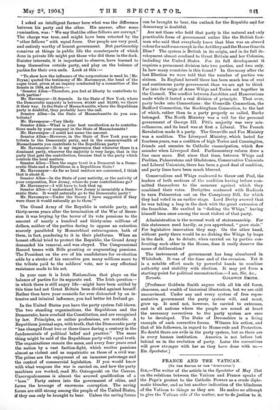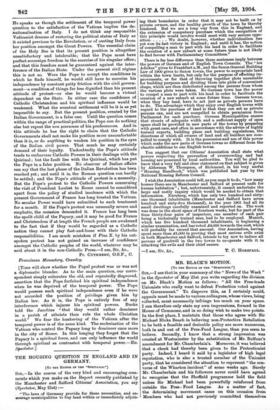[To ME EDITOR Or THE "SPECTATOR.") Sin,—The writer of the
article in the Spectator of May 21st on the relations between the Vatican and France speaks of the Pope's protest to the Catholic Powers as a crude diplo- matic blunder, and as but another indication of the blindness of the Vatican to things as they are. He makes no attempt to give the Vatican side of the matter, nor to do justice to it.
He speaks as though the settlement of the temporal power question to the satisfaction of the Vatican implies the de- nationalisation of Italy. I do not think any responsible Vaticanist dreams of restoring the political status of Italy as it existed previous to the Revolution, or of ousting Italy from her position amongst the Great Powers. The essential claim of the Holy See is that its present position is altogether unsatisfactory and intolerable; that the Pope must have perfect sovereign freedom in the exercise of his singular office; and that this freedom must be guaranteed against the inter- ference of the Italian State. Under the present civil regime this is not so. Were the Pope to accept the conditions in which he finds himself, he would still have to exercise his independence by constant petty friction with the civil govern- ment—a condition of things far less dignified than his present attitude of protest—or else he would become a virtual dependent on the State. In either case the confidence of Catholic Christendom and his spiritual influence would be weakened. What the eventual settlement will be it is as yet impossible to say. But the present position, created by the Italian Government, is a false one. Until the question comes within the range of practical politics, the Pope can do nothing else but repeat the non possumus of his predecessors. And in this attitude he has the right to claim that the Catholic Governments shall not make his position more uncomfortable than it is, or do anything to weaken his position in the eyes of the Italian civil power. That much be may certainly demand of their loyalty. Undoubtedly the Pope's attitude tends to embarrass Catholic Powers in their dealings with the Quirinal ; but the fault lies with the Quirinal, which has put the Pope in a false position. No observer of Italian affairs can say that the last phase of the Italian Revolution has been reached yet ; and until it is, the Roman question can hardly be settled; and the Pope's attitude of protest is a necessity. But the Pope's protest to the Catholic Powers concerning the visit of President Loubet to Rome cannot be considered apart from the policy of studied insolence with which the present Government of France has long treated the Vatican. No secular Power would have submitted to such treatment for a month. If the Pope's protest was unusually severe and emphatic, the occasion demanded it. France has long been the spoilt child of the Papacy, and it may be good for France and Christendom if at length the French people are awakened to the fact that if they would be regarded as a Catholic nation they cannot play fast-and-loose with their Catholic responsibilities. I am much mistaken if Pius X. by his out- spoken protest has not gained an increase of confidence amongst the Catholic peoples of the world, whatever may be said about it in the non-Catholic Press.—I am, Sir, &c., (Time will show whether the Papal protest was or was not a diplomatic blunder. As to the main question, our corre- spondent simply reiterates the old, and repeatedly disproved, assertion that the Pope forfeited his spiritual independence when he was deprived of the temporal power. The Pope would possess such spiritual independence even if he were not accorded the position of privilege given him by Italian law. As it is, the Pope is entirely free of any interference which injures his spiritual powers. Burke told the Jacobins "that they would rather domineer in a parish of atheists than rule the whole Christian world." We fear the hankering of the Vatican after the temporal power is of the same kind. The ecclesiastics of the Vatican who control the Papacy long to domineer once more in the city of Rome. In this longing they forget that the Papacy is a spiritual force, and can only influence the world through spiritual as contrasted with temporal power.—En. Spectator.]







































 Previous page
Previous page